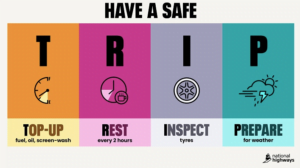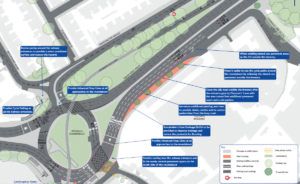The Australian AI road safety company Acusensus has won a Prince Michael International Road Safety Award for its ‘Heads-Up’ technology which spots drivers using mobile phones at the wheel, or vehicle occupants not wearing a seat belt.
The prestigious awards, which have run for more than 30 years, are designed to give public recognition to those who have improved road safety, recognise outstanding achievement and innovation world-wide. The judges say that changing the behaviour of road users through education and enforcement are essential for improved safety.
The winning solution, which was pioneered in Australia and is now being utilised in the UK and the United States, uses bespoke roadside cameras and Artificial Intelligence-based image analysis to flag up likely violations involving people holding a phone or not wearing a seat belt. Anonymised images of possible rule-breakers are sent for human review, to decide if a potential offence has occurred.
Distracted driving has been identified as a problem for many years, however the dramatic growth of smart phone use globally has led to rising road trauma and an increased need and desire to produce a practical, operational solution to address this issue, delivering long term, wide scale driver behaviour change.
‘Heads-Up’ was created to initially prove that distracted driving could be detected by technology, and this concept has subsequently been demonstrated, developed and now applied to the world’s first distracted driving enforcement programmes; operational across three Australian jurisdictions.
The judges said they were “especially impressed by the effectiveness of the technology and that it is now fully operational across several states in Australia”. The first state-wide scheme rolled out in New South Wales in 2019 has had a significant impact on driver behaviour as people discovered that the technology existed and that they face the real prospect of being caught if they break the rules. The number of mobile phone detections have dropped by a factor of six, from 1 in 82 drivers spotted holding a phone in 2019 to 1 in 478 drivers in 2021 and 1 in every 534 in 2023.
The system has been further developed to detect drivers and front seat passengers who are not wearing seat belts, using the same configuration and image capture system. This uniquely addresses two of the “fatal four” road safety risks – distracted driving and seatbelt wearing, with the other two being speeding and drink/drug driving.
The judges also noted the international pilots running in another four continents, including the United Kingdom. The same technology has been evaluated in the USA, Spain, Netherlands, Belgium, India, South Africa, Canada and New Zealand. Acusensus adds that, where fine revenues can be reinvested into road safety, the system pays for itself entirely, ensuring long term sustainability.
Acusensus Managing Director Alexander Jannink (pictured) said he was honoured that his company was acknowledged for its contribution to reducing road trauma and fatalities.
“Our mission is to make roads as safe as possible. Despite improved vehicle design and other road safety improvements, road casualties have actually been increasing since 2013, largely attributed to poor driver behaviours including distracted driving. Our technology is designed to prevent hundreds of thousands of deaths and road injuries worldwide,” Jannink said.
“It’s gratifying for our technology to be recognised by the industry for its ability to efficiently change behaviours of drivers on a larger scale, and we hope this recognition will pave the way for more jurisdictions to follow in adopting this proven solution.”





















